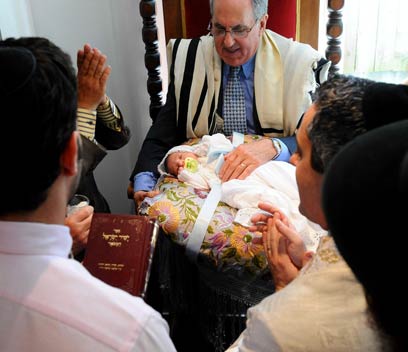
_a.jpg)
As the struggle to conduct weddings continues, Tzohar is expanding its activity by offering additional religious services. The organization's rabbis have announced a new initiative: Tzohar Mohels, who will offer friendly, inclusive circumcision ceremonies. The rabbis have promised to meet with clients before and after the ceremony and not charge a higher fee than that determined by the Chief Rabbinate.
At a launch event for the new project held in Petah Tikva, Tzohar Chairman Rabbi David Stav noted that in recent years the consensus on circumcision in Israel had been shaken, and there was concern that in the future many non-observant parents would not circumcise their sons or would do so not in accordance with Jewish law.
Related stories:
- Circumcision to be considered a crime in Germany?
- Rabbinate eases wedding regulations for Tzohar rabbis
- Tzohar bill passes preliminary reading
According to Stav, preemptive action was necessary to help parents identify with the religious ceremony and choose to hold it. "We can't react too late, after it's already a trend," he said.

Tzohar feels privileged to help welcome newborns into Judaism (Photo: AP)
Stav admitted that, unlike issues of marriage, there was not any particular tension between the Israeli public as a whole and the rabbinical institution regarding circumcision, but said that some parents were "scared and suspicious" of the ceremony. Tzohar is seeking to conciliate them by building a nationwide team of 10 doctors and certified mohels, who in addition to their professional training will also be taught to work with parents.
"We're not saying that no one has done this, but there's a great need," Stav said.
The "freebie" aspect that came to be associated with Tzohar marriages will not apply to circumcisions, but Tzohar believes that the public will opt for their mohels from other reasons. Tzohar mohels will have a sympathetic ear for the parents' needs – as far as Jewish law and the Chief Rabbinate allow. As far as anesthesia during the brit – a very common request today – goes, they can do nothing, since it is considered "dangerous from a medical and halachic perspective."
The mohels will show up to the brit milah ceremonies on time, dressed in special white robes, and will charge NIS 1,000. They will provide receipts for the service as stipulated by law and will be available during the baby's recovery period. "At the end of the day, they need to make a living," Stav explained. "It's not like weddings, where the service was free because rabbis who were on the state's payroll also charged couples. But no one pays mohels for a brit."
"Undergoing a brit is a chance for every Jew to experience the deep connection between himself and the Jewish people and the Creator. Tzohar feels privileged and obligated to work with parents on this important occasion that ushers a newborn into Judaism, and to do so in a way that leaves the best impression in years to come."















